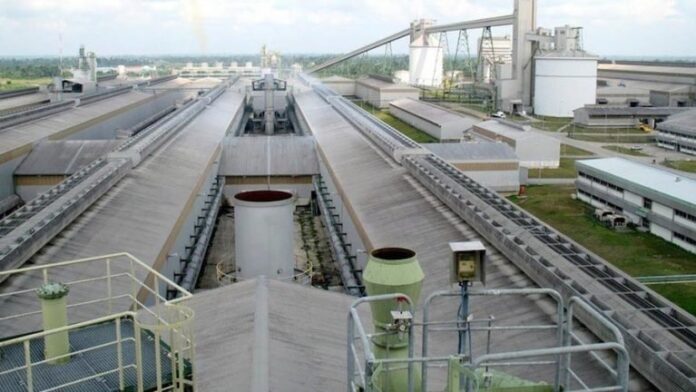Nigeria has recorded a remarkable ₦682 billion in aluminum exports in the first nine months of 2024, signaling a significant boost in foreign trade earnings despite the persistent dormancy of its sole aluminum smelting plant, the Aluminum Smelter Company of Nigeria (ALSCON).
Data from the National Bureau of Statistics (NBS) reveal that the exports, categorized as “unwrought aluminum alloys,” were shipped in various forms, including ingots, blocks, billets, and slabs. This represents a striking achievement for a nation whose primary aluminum smelting facility has been plagued by inactivity and ownership disputes for over two decades.
Quarterly Breakdown of Aluminum Exports
The NBS report highlights that Nigeria exported ₦84 billion worth of aluminum in the first quarter of 2024, followed by a substantial leap to ₦480 billion in the second quarter. Exports slightly tapered to ₦116 billion in the third quarter.
Japan emerged as the largest buyer, accounting for ₦218.3 billion of the total exports, while China ranked second with imports worth ₦43.5 billion.
ALSCON: A Dormant Giant
ALSCON, located in Ikot Abasi, Akwa Ibom State, has remained idle since 2000 despite its capacity to produce 193,000 tons of aluminum annually. Commissioned in 1997, the plant ceased operations after a series of challenges, including unreliable gas supplies, ownership conflicts, and technical issues.
In 2007, Russian aluminum giant United Company RUSAL (UC RUSAL) acquired an 85% stake in ALSCON, with the Nigerian government retaining the remaining shares. Although RUSAL modernized the facility, operations were suspended again in 2013 due to gas supply shortages, rendering production unsustainable.
The plant’s woes were further compounded by a contentious ownership battle with an American company, Bancorp Financial Investment Group (BFIG). Both companies secured favorable court rulings over the years, leaving the matter unresolved.
Government and Investor Efforts to Revive ALSCON
The federal government has renewed efforts to bring ALSCON back to life, seeing it as a critical driver of industrial growth. In 2023, the government announced plans to revive the plant, with Petroleum Resources (Gas) Minister Ekperikpe Ekpo describing the move as a “significant boost to investor confidence.”
Ekpo led a delegation to Beijing to engage the China National Chemical Engineering Corporation (CNCEC) on potential partnerships to rehabilitate ALSCON. The delegation included representatives of BFIG, identified as the preferred bidder during the plant’s privatisation.
Similarly, UC RUSAL has pledged to invest $500 million into the facility. During a visit to President Bola Tinubu in July, ALSCON Chairman Alexey Arnautov emphasized the transformative potential of this investment. “The injection of $500 million within a specific timeframe will significantly enhance the company’s performance,” Arnautov said.
President Tinubu also reiterated his administration’s commitment to reviving the smelter, describing it as a cornerstone for Nigeria’s industrial and economic development.
Nigeria’s Aluminum Export: A Paradox of Growth
Despite ALSCON’s dormancy, Nigeria’s aluminum export sector has continued to thrive, thanks to global demand for raw aluminum materials. The nation’s ability to export unwrought aluminum in substantial volumes has raised questions about how it achieves such feats without a functional smelting facility.
Industry analysts believe that Nigeria’s exports rely heavily on raw materials sourced from secondary producers or processed scraps rather than primary production. However, the lack of a fully operational smelting plant has deprived the nation of the added value and employment opportunities that come with aluminum processing.
“The aluminum export figures are impressive, but we need to ask ourselves how much more we could achieve if ALSCON were functional,” said Dr. Samuel Adeniyi, an economist. “A revived ALSCON could elevate Nigeria from a raw material exporter to a value-added producer, with significant benefits for the economy.”
The Global Aluminum Market
Nigeria’s aluminum exports come at a time when global demand for aluminum remains robust, driven by its use in construction, transportation, and renewable energy sectors. Japan, the leading importer of Nigeria’s aluminum, relies heavily on the material for its advanced manufacturing industries.
China, another major importer, is a global hub for aluminum production but also imports raw materials to meet its growing industrial needs.
Reviving ALSCON: The Road Ahead
Experts argue that reviving ALSCON is not just about resolving its ownership tussle but also addressing infrastructural and operational challenges, particularly gas supply. Without reliable and affordable energy, restarting the plant could remain a pipe dream.
However, the government’s recent moves have inspired cautious optimism. “We are on the cusp of a new chapter for ALSCON,” said Ekpo during the Beijing meeting. “Once operational, this facility will not only boost aluminum production but also create jobs and stimulate economic activities in Akwa Ibom State and beyond.”

